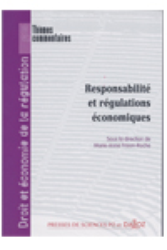Oct. 24, 2024
Thesaurus : 03. Conseil d'Etat
► Référence complète : CE, Ass., 24 octobre 2024, 465144, Mutuelle centrale de réassurance (MCR)
____
________
Nov. 27, 2021
Conferences

► Full Reference: Frison-Roche, M.-A., Chair for "The temporal dimension: Imminence and Intertemporally", in Climate Change Cases before National and International Courts Cross-fertilization and Convergence", November 27, 2021, Paris.
____
Summary of the panel presentation: The specific topic of our panel is the “temporal dimension” of the judicial cases of Climate change.
We shall listen to two great experts on this topic, which is Time.
Listening the other previous speakers, I understand how this topic is important, because Climate Change requires an immediate action and it create a political issue, because everyone comes before courts.
A basis and fundamental problem, because the times are not adjusted.
let's come back to basic notions, to have three times : “past, present, future”.
The issue of Climate Change is in the Future, the necessity of Action is in the Present and the basis temporal question is to know if Courts are the bodies adequate to responde ; maybe it is inevitable that Judge must be recreate their office because the time of the classical judicial office is the Past.
Immediately, this simple et huge problem appears : in a classical repartition, the judge is the legal character to intervenir for the Past, the present (maybe is for you and me), and the future is the time for the State, and more precisely for the Parliament.
But the climate change is a huge topic, not in the past, not in the present, but in the future.
Therefore a gap exists between the time of the topic and the time of the court before the case is explained for obtaining a solution : how to give a good answer ? Judge maybe must travel in time, from past to future …. Maybe, he must, but might he?
Classically, the judge can anticipate a very next future, but not the more distant and systemic future. Climate change belongs to the second one.
This is why the title of this panel is non only about the necessity to take in consideration the “imminence” but also the “intertemporally” : maybe court are the sole able to create this intertemporality between Past and Future, and by this way to obtain from States and companies to do something immediately !
By two legal ways.
Courts can stay in Past, supervising States, if they dispose of effective legal decisions taken by States in the past about Climate Change (essentially Paris Agreement, for instance transposed in the French legal system by a formal law). This is why an efficient judicial solution would be the possibility for the courts to oblige State to implement their more or less committment they had taken in the past for the future (as the Conseil d’Etat did in the Commune de Grande-Synthe Cas Law).
Even for that, the courts must adopt a creative notion of what is a commitment from a State through a Law... ; as they must do about private companies comitment (in their codes of conduct or soft law of corporate social responsability).
But what to do if States didn’t take such commitment ?
Some can allege Courts are not Parliaments and are not legitimate to rule for the future … It is a political issue, a very classical one but very accurate for Climate change (where States and companies are face to courts...) and maybe And as our colleague said, judicial system is quite technically weak to concretize human rights.
Therefore, the second way, more innovative, est the new use of Tort Law : no more a liability Ex Post, but a responsibility Ex Ante. In every legal system, even in Civil Law systems, Tort Law is conceived by courts (for instance in French Law).
If the new reasoning is conveived in Ex Ante, Tort Law must be a set of legal tools to reach the monumental tools to reach the "Monumental Goal" (being by nature future) which is the Climate Change stopping.
In this teleological reasoning, the admissibility and the choice remedies, must be adapted to obtain what is central : the effectivity and the efficiencicy.
In this sens, the judgement between two parties (which was an Ex Post act) may be conceived as an systemic efficient action (which was an Ex Ante act), because it must be.
_____
June 15, 2021
Compliance: at the moment

► Money Laundering, Cryptocurrency and the Art of Saying It: the Financial Conduct Authority (FCA) statement of June 3, 2021 and the Art of Saying It. Law is softer than ever.
The English have their way of saying things: thus the Financial Conduct Authority -FCA, the British financial market regulator, published on June 3, 2021 a press release whose expression is remarkable. Its subject matter is crypto-assets and, like in an essay plan à la française, it is built in two parts.
In the part I, it is just mentioned that the deadline for companies in this industry to obtain a registration, which was due to end soon, will be postponed to March 2022. Why? Because almost all of them have not been able to demonstrate their ability not to be resistant to money laundering and other criminal activities. This is in no way presented as a conviction, just the objective cause of a postponement of the date, the time for the Financial Regulatory Authority to better examine the files, themselves to be completed by applicants.
The part II concerns consumer protection. The Authority point out that the consumer can lose everything in an extremely risky products and underlines that it is unlikely that this ruined layman will even be able to access the ombudsman to obtain anything. It is purely informative.
This is how the English bodies formulate their opinion on cryptoasset.
It's elegant (the press is more direct).
This also makes it possible not to be covered with insults by the worshipers of these objects: are expressed just a technical delay granted and not a conviction that cryptoasset could be per se an instrument of criminality, just a probationary difficulty ; and just a regret on the non-access to the ombudsman for these cryptoassets consumers.
But if the evolution of the bubble leads these investors to ruine shows, the Regulator will have warned and expressed in advance the regrets he had of the lack of legal technique to protect them. And if the facts show that it is massively through cryptocurrency that the crime is whitewashed, the Regulator has shown everyone his prudence, the delay it will have take to examine the files and its kind foresight.
No one more than a British knows what Liability is.
_____
Jan. 23, 2019
Interviews

Référence générale : Frison-Roche, M.-A., Participation à la table-ronde : De la responsabilité pénale des personnes morales à celle des dirigeants, vers une mutation du droit pénal, Lettre des Juristes d'Affaires, 23 janvier 2019, pp. 15-31.
Présentation :
En l'absence d'instance internationale, la répression des infractions des entreprises relève du droit national. Et tous les pays ne sont pas alignés.
En Allemagne, par exemple, la récente affaire du Diesel Gate a rappelé qu'il n'existait pas de régime de responsabilité pénale des personnes morales.
Aux États-Unis, elle est très lourdement réprimée. En France, elle existe depuis 1993 et s'étend sous l'influence de la Cour de cassation . Depuis l'appel de Genève en 1996, la justice s'est également attachée à mettre un terme à l'impunité qui régnait pour les dirigeants. Aujourd'hui, les mises en cause de la personne morale et du dirigeant sont quasiment systématiquement liées.
Quelle est la stratégie suivie par les institutions judiciaires françaises? Quels sont les risques encourus par les personnes physiques ? Quelles conséquences à l'introduction en droit français de la justice négociées ?
Updated: July 31, 2013 (Initial publication: Sept. 20, 2011)
Teachings : Les Grandes Questions du Droit, semestre d'automne 2011

April 7, 2007
Publications

Références complètes : FRISON-ROCHE, Marie-Anne (dir.), Responsabilité et régulation économique, coll. "Droit et Economie de la Régulation", vol.5, Dalloz / Presses de Sciences Po, 2007, 187 pages.
L'ouvrage analyse dans sa première partie le rôle des responsabilités dans les régulations économiques d'une façon générale. Pour l'analyse économique, cela s'insère dans la perspective des incitations, tandis que les juristes, plus attachés aux principes fondamentaux du droit pénal, sont réticents face à cette instrumentalisation. Le droit public conçoit davantage la responsabilité comme un mode de reddition des comptes pour des structures puissantes et indépendantes. La seconde partie de l'ouvrage porte sur des secteurs particuliers, à savoir le secteur bancaire et financier, le secteur de la publicité et l'arbitrage CERDI.
Accéder à l'article de Marie-Anne Frison-Roche : Responsabilité, indépendante et reddition des comptes dans les systèmes de régulation économique
Lire le résumé de l'ouvrage ci-dessous.
Dec. 16, 2004
Publications
